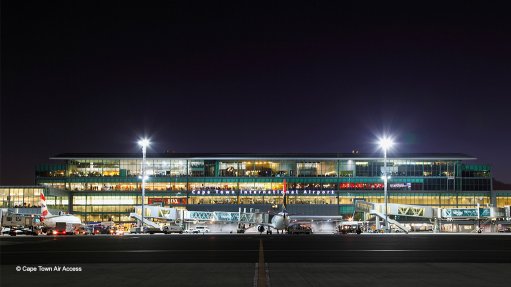Platinum-based green hydrogen on way to becoming SA’s new gold – CHIETA

CHIETA CEO Yershen Pillay interviewed by Mining Weekly's Martin Creamer. Video: Darlene Creamer.
Three new green hydrogen qualifications are being registered with the Quality Council for Trades and Occupations (QCTO) to enable South Africa to seize the platinum group metals- (PGMs-) linked green hydrogen opportunity as its green shoots grow stronger roots at a time when the disrupted world is in eager need of a promising new planet-friendly economic direction.
Last month, the emerging green hydrogen fuel cell economy received a R90-billion stimulus opportunity from European Commission president Ursula von der Leyen, who urged South Africa while in Cape Town to get going on green hydrogen.
Emerging simultaneously are enabling new green hydrogen qualifications, with South Africa’s Chemical Industries Education and Training Authority (CHIETA) working with sister sector education and training authorities (Setas) such as the Mining Qualifications Authority (MQA) and the Transport Education and Training Authority (TETA) on the green resource that has the strong potential to fundamentally transform the global economy and to reindustrialise South Africa.
“Green hydrogen’s becoming the new gold,” CHIETA CEO Yershen Pillay remarked to Engineering News & Mining Weekly in a Zoom interview.
CHIETA data suggests that the overall employment need embraces about 178 key skills and competencies, with the 17 that CHIETA needs to develop covering gas engineers, hydrogen systems engineers and hydrogen technicians.
Being registered by CHIETA with the QCTO are three new qualifications.
The first is that of a green hydrogen technology practitioner. This will ensure that you have the skill on site to manage your green hydrogen technologies, such as your electrolyser technologies.
The second is that of a green hydrogen production practitioner. CHIETA has been working with some of its linked companies such as Sasol, Afrox, Air Products and Rheinmetall, and many of them require some form of production expertise to produce green hydrogen on site.
The third qualification is that of a green hydrogen storage and fuel transporter, because transporting hydrogen is very dangerous. It’s a gas that is highly explosive, especially at high temperatures. Safety standards are needed and people will have to be qualified to transport and store green hydrogen.
“These are the three qualifications that we’re contributing as the chemical Seta to ensure that we have an adequate skills infrastructure to seize the green hydrogen opportunity as a country,” Pillay explained.
“Our entire development process is informed by our stakeholders. The companies themselves, the training providers, all approached us as CHIETA, and they said to us that this is where the demand lies. We need pipe fitters, for example, on site and they need to be adequately trained.
“What we’ve been able to do is to work closely with the likes of Sasol, Air Products and various other companies like Rheinmetall, who say they will be able to absorb these skills.
“We have plans to implement the first-of-its-kind Green Hydrogen Centre of Specialisation. This centre of specialisation is going to be in collaboration with our higher education institutions, such a universities, as well as our technical and vocational education and training (TVET) colleges.
“We are collaborating with some of our sister Setas – the MQA, as we know, there are quite a few developments in the mining space – with companies like Anglo American venturing into green hydrogen trucks, et cetera, and then we’re collaborating with TETA on the transport side.
“Ninety-five per cent of the green hydrogen economy is transport orientated, so without transport infrastructure, we will not be able to import components or export green hydrogen.
“We’re going to be identifying at least two universities. We’re looking at the University of Johannesburg, which has got a green hydrogen chairperson, for example, and they have some expertise in that area.
“We haven’t yet identified TVET colleges, but the Green Hydrogen Centre of Specialisation will be hosted in one of these TVET colleges and universities, such as the University of Johannesburg, in collaboration with other Setas.”
Engineering News & Mining Weekly: The world is also transforming digitally. What is the CHIETA doing to train people to be able to cope with digital advance?
Pillay: We’re living in a digital First World, so we need to have digitally savvy, digitally literate and data literate citizens. One of the things that we’re looking to do is to bridge this digital skills divide that currently exists in the country. The data from Statistics South Africa indicates to us that only 1.7% of rural households have fixed Internet access at home, which means that the vast majority of our more than 30% of rural communities [nationally], cannot access the Internet and digital technology. We currently talk about the Fourth Industrial Revolution (4IR) when we’ve got so many of our poor rural communities who are left behind. To ensure that no one is left behind, one of the things we’ve established are Smart Skill Centres, which are designed to address this problem of a digital divide between urban and rural communities. The Smart Skill Centres are spaces for training using digital technologies such as virtual reality, augmented reality, and AI, to close the digital skills gap. If you’re in the chemical sector and you’re an analytical chemist, you could be upskilled as a data scientist, which then broadens your horizons for new opportunities to then also be eligible for more opportunities as a data scientist, or to exploit the opportunities that the 4IR brings with it. We’ve established about six of these Smart Skill Centres. They are all in rural communities, from Saldanha Bay to Modjadjiskloof in Limpopo, and we’re working with the private sector. This is a practical example of a public- private partnership in action. We have our Gauteng Smart Skill Centre, which is going to be with the PG Glass Group, one of the largest commercial glass-producing companies in the country, and the centre will ensure, together with the PG Glass Group, that we bring gamification, AI to training glass fitters, for example, for the glass sector, and making sure you have tech savvy artisans. Our goal is to have nine Smart Skill Centres, one in each province. Thus far, more than 26 000 rural poor have been trained with some form of digital skill that could range from expertise as a cybersecurity practitioner or a Java developer or a data scientist, and therefore able to access new opportunities through our Smart Skill Centre. We’re working closely with the private sector to have one Smart Skill Centre in every province by the end of this year.
Article Enquiry
Email Article
Save Article
Feedback
To advertise email advertising@creamermedia.co.za or click here
Press Office
Announcements
What's On
Subscribe to improve your user experience...
Option 1 (equivalent of R125 a month):
Receive a weekly copy of Creamer Media's Engineering News & Mining Weekly magazine
(print copy for those in South Africa and e-magazine for those outside of South Africa)
Receive daily email newsletters
Access to full search results
Access archive of magazine back copies
Access to Projects in Progress
Access to ONE Research Report of your choice in PDF format
Option 2 (equivalent of R375 a month):
All benefits from Option 1
PLUS
Access to Creamer Media's Research Channel Africa for ALL Research Reports, in PDF format, on various industrial and mining sectors
including Electricity; Water; Energy Transition; Hydrogen; Roads, Rail and Ports; Coal; Gold; Platinum; Battery Metals; etc.
Already a subscriber?
Forgotten your password?
Receive weekly copy of Creamer Media's Engineering News & Mining Weekly magazine (print copy for those in South Africa and e-magazine for those outside of South Africa)
➕
Recieve daily email newsletters
➕
Access to full search results
➕
Access archive of magazine back copies
➕
Access to Projects in Progress
➕
Access to ONE Research Report of your choice in PDF format
RESEARCH CHANNEL AFRICA
R4500 (equivalent of R375 a month)
SUBSCRIBEAll benefits from Option 1
➕
Access to Creamer Media's Research Channel Africa for ALL Research Reports on various industrial and mining sectors, in PDF format, including on:
Electricity
➕
Water
➕
Energy Transition
➕
Hydrogen
➕
Roads, Rail and Ports
➕
Coal
➕
Gold
➕
Platinum
➕
Battery Metals
➕
etc.
Receive all benefits from Option 1 or Option 2 delivered to numerous people at your company
➕
Multiple User names and Passwords for simultaneous log-ins
➕
Intranet integration access to all in your organisation


















